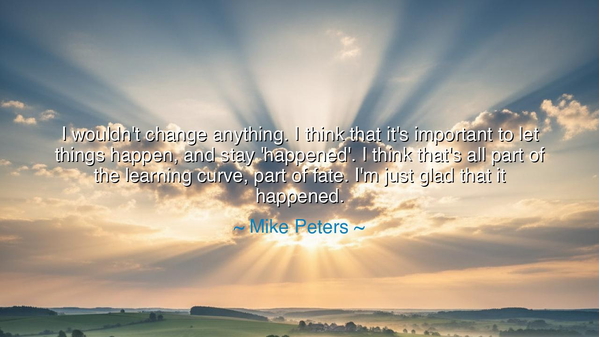
I wouldn't change anything. I think that it's important to let
I wouldn't change anything. I think that it's important to let things happen, and stay 'happened'. I think that's all part of the learning curve, part of fate. I'm just glad that it happened.






“I wouldn’t change anything. I think that it’s important to let things happen, and stay ‘happened.’ I think that’s all part of the learning curve, part of fate. I’m just glad that it happened.” — Mike Peters
In these humble yet luminous words, Mike Peters speaks as one who has made peace with the tides of life. His tone is not one of resignation, but of deep understanding — a serenity born from struggle and reflection. To say “I wouldn’t change anything” is not to claim a life free of pain or regret, but to embrace every wound as a teacher and every loss as a sculptor of the soul. He reminds us that all that happens — the joys and the sorrows, the triumphs and the failures — are the hands of fate, molding us into who we are meant to become. The wise of old would have called this acceptance amor fati — the love of fate — a state in which the heart no longer fights the past, but blesses it.
To let things happen and stay ‘happened’ is an act of courage in a world that longs to rewrite its history. The human heart often aches to undo what has been done — to erase mistakes, to reclaim moments lost to time. But Peters’ words remind us that nothing in life is wasted. Each event, once lived, becomes sacred. The past, when accepted, is transformed into wisdom; when resisted, it becomes a chain. To let what has happened remain is to acknowledge the divine order that threads through chaos — to see that the universe, in its mysterious rhythm, brings both suffering and beauty for our awakening.
Consider the story of Nelson Mandela, who spent twenty-seven years imprisoned for his defiance against injustice. Many would have emerged from such darkness filled with bitterness, desiring to change their fate, to curse the years stolen from them. Yet Mandela did not. He accepted his suffering as part of his learning curve, the furnace in which his soul was refined. He later said that prison had taught him patience, perspective, and forgiveness — lessons without which he could never have led his people to freedom. Like Peters, Mandela was glad that it happened, for he understood that even pain can serve the greater harmony of destiny.
This acceptance is not passive surrender, but spiritual mastery. To let life flow and to learn from its unfolding is to trust the wisdom of fate, that unseen artist who paints our stories with light and shadow alike. The ancients compared life to a tapestry: from the underside, it appears tangled and chaotic; but when viewed from above, it reveals perfect design. Peters’ reflection invites us to rise above our narrow view of suffering and glimpse the hidden pattern. When we cease wishing the past were different, we free ourselves to live fully in the present — and that, in itself, is liberation.
The phrase “learning curve” is modest, but within it lies profound truth. Growth is never linear. It bends, it stumbles, it rises again. Every mistake becomes a step upward on the ladder of understanding. The child learns to walk through falling; the artist learns to create through failure; the soul learns to love through loss. If we erased the pain, we would erase the progress. Peters’ wisdom is the recognition that all of life, with its imperfections and unpredictability, is the classroom of the divine. To despise any lesson is to halt our evolution.
There is, too, a quiet gratitude in his words: “I’m just glad that it happened.” Such gladness is the mark of one who has transcended resentment and arrived at peace. Gratitude for all that has been — even the sorrow — is the purest form of enlightenment. It is the song of the soul that has learned to see blessing in every storm. The heart that can say “thank you” for both joy and hardship has reached the highest state of wisdom known to humankind.
So, dear seeker, learn from Peters’ example. Do not wish to change the story that shaped you. Let every happened remain, and honor it. Reflect upon your past not as a burden, but as sacred ground — the soil from which your strength has grown. Trust that your fate, however mysterious, is not against you but for you. And when you look back upon your life, may you, too, whisper with peace and wonder, “I’m just glad that it happened.” For in that whisper lies the soul’s greatest triumph: the power to turn every moment, even the painful ones, into light.






AAdministratorAdministrator
Welcome, honored guests. Please leave a comment, we will respond soon